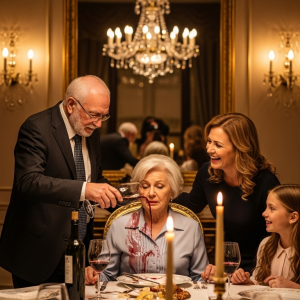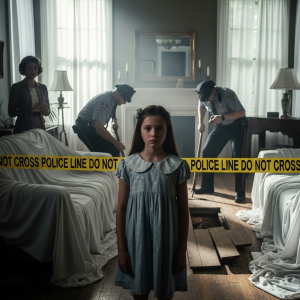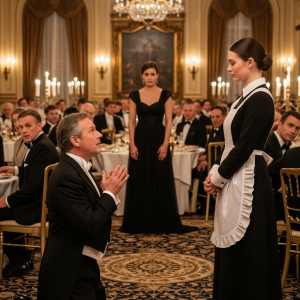Our love story began like a perfectly scripted fairytale, the kind I used to design gardens for. I was Emily Wright, a landscape designer with more passion than pedigree, raised by my hardworking uncle. He was Robert Brown, impossibly handsome, effortlessly charming, and the sole heir to the formidable Stroy Garant construction empire. We met on the rooftop garden of one of his company’s luxury condominium projects, a splash of green life amidst a city of concrete, and I fell for him almost instantly.
For a few intoxicating months, life felt magical. He would whisk me away to candlelit dinners, surprise me with weekend trips, and listen with rapt attention as I spoke about floral compositions and perennial cycles. He made me feel seen, cherished, and for the first time in my life, I allowed myself to believe in a happily-ever-after. That beautiful, fragile fantasy began to break apart the moment I met his parents.
The Browns lived in a sprawling, modernist mansion filled with marble and glass that seemed to radiate a chilling, unlivable coldness. His mother, Selena, scanned me from head to toe, her eyes like a jeweler’s loupe, assessing my worth and finding it wanting. Her perfectly manicured hand didn’t even fully commit to our handshake; it was a brief, dismissive brush of fingertips.
“A landscape designer?” she repeated slowly after I introduced myself, her voice heavy with a silken disapproval. “Is that… essentially a more sophisticated term for a gardener?”
Her husband, Charles Brown, was a large, imposing man who radiated an aura of absolute authority. He presided over the dinner table like a king holding court, barely looking at me as he spoke of acquisitions, stock portfolios, and the incompetence of his business rivals. It became painfully clear that they saw me as nothing more than a poor, nameless orphan, raised by a simple construction worker with grease under his fingernails. I was not a guest; I was an exhibit of their son’s poor judgment.
Despite the arctic chill of their welcome, Robert proposed a month later with a diamond ring so large it felt foreign on my hand. I convinced myself that our love was a fortress, strong enough to withstand any siege.
I was a fool.
At our official engagement dinner, held at their sterile, joyless home, Selena made their position clear. Robert sat beside me, staring intently at his plate as if it held the secrets of the universe, his spine rigid.
“We feel it is important,” Selena announced to the small gathering of their elite friends, “that Robert and Emily learn to stand on their own two feet. Therefore, we will not be funding this… ridiculous match. Not a single penny. Consider this a test of your independence. Let us all see what your little builder uncle can manage to scrape together.”
The room was thick with a gloating, satisfied silence. That night, I cried in my uncle’s arms, my tears soaking the worn flannel of his shirt. Marcus Wright wasn’t just my uncle—he had been my father, my mother, my entire world since my parents were stolen from me in a car crash when I was a child. He listened without interrupting, his strong, calloused hands patting my back until the sobs subsided, his lips pressed into a thin, determined line.
“They think you’re nothing, Emmy?” he said at last, his voice a low, dangerous rumble. “They think our name is worthless?” He pulled back, his eyes, usually so warm and kind, now glinting with a hard, cold fire. “Then you listen to me very carefully. You will have your wedding. It will be the most beautiful, most breathtaking wedding this city has ever seen. I will pay for everything. And we will not tell them a single word about where the money comes from. Let them believe whatever they want. We’ll see who has the last word.”
From that day forward, the wedding ceased to be a celebration of love. It became a meticulously planned strategic operation. My uncle, the man I’d only ever seen manage a small crew and three aging trucks, moved with the precision of a four-star general. He spared no expense.
We didn’t just book a venue; we secured the city’s most prestigious and exclusive location, the Emerald Forest Country Club, a place the Browns themselves had been on a waiting list for years. We didn’t just order flowers; my uncle flew in a renowned floral artist from Paris who transformed the grand ballroom into an enchanted forest of thousands of white orchids and roses. We hired a famous live band, a celebrity chef, and a fireworks display that required special city permits.
When Robert saw the final budget, his eyes went wide with a mixture of awe and terror. “Emily, this is certifiably insane! Did your uncle take out a second mortgage on his entire life? This is more than my yearly salary!”
“He said nothing is too much for his only niece,” I replied, my voice calm, repeating the line my uncle had instructed me to use. I felt a pang of guilt at the deception, but it was quickly extinguished by the memory of Selena’s sneer and Charles’s dismissive glare.
The Browns’ contempt only festered and grew. They would whisper to each other at family functions, their voices low but their disdain palpable. “He’s got three old trucks and one rusty excavator,” I overheard Charles telling Robert one Sunday afternoon. “Where did a man like that get millions? He must have taken out predatory loans. This will be a financial stain on our family’s reputation for years to come.”
Robert began to change, too. The charming, attentive man I fell in love with was replaced by a distant, irritable stranger. The pressure from his parents was eroding him, and instead of shielding me, he turned his anxiety on me.
“Emily, do we really need a half-million-dollar fireworks show?” he demanded one night, his voice tight with stress. “It’s needlessly extravagant. My parents are going to have a fit.”
“Yes, Robert,” I answered quietly, my heart aching with a cold, sad certainty. “It’s what my uncle wants for me.” In that moment, I knew. I was marrying a man who would never stand up for me, a man whose spine was made of jelly, not steel.
I called my uncle, my voice trembling with doubt. “I can’t do this, Uncle Marcus. I can’t marry him.”
“Hold on, Emily,” my uncle’s calm, steady voice reassured me through the phone. “You’re almost there. Trust the plan. The truth will come out very, very soon.”
A week before the wedding, the Browns held a private, lavish dinner for their closest friends and business partners. My uncle was, pointedly, not invited. At the end of the meal, Charles stood to give a toast, a self-satisfied smirk on his face as he raised his crystal glass of champagne.
“Here’s to resourcefulness,” he began, his eyes finding mine across the table. “A valuable trait in any endeavor. Some people invest in stocks, some in property, and some”—he paused, letting the silence hang before looking straight at me—“invest in a marriage. It is, perhaps, the riskiest asset class, but sometimes, the most profitable. Cheers to the brave investors.”
The table erupted in polite, knowing laughter. Robert laughed, too. He sat right beside me and laughed with his father. I stood up, my chair making a quiet, scraping sound on the marble floor, left the table without a word, and headed for the exit. Robert caught up with me in the grand foyer.
“Are you seriously upset? My dad was just making a joke,” he said, grabbing my arm.
I pulled away from him, my voice shaking with a rage I could no longer contain. “He called me a gold digger in front of thirty of your closest friends, Robert. And you laughed. You sat there and you laughed.”
I walked out into the cold night air, called a cab, and left him standing there. I was ready to cancel everything, to burn the half-million-dollar wedding dress. But then I remembered my uncle’s words. This wasn’t going to be a wedding anymore. It was going to be a battlefield. And I was going to win.
The wedding day arrived, a glorious, sun-drenched Saturday. As I walked down the aisle, a sea of white orchids on either side, I felt a strange, detached calm. I stood at the altar, my hand in Robert’s, and spoke my vows with a clear, emotionless voice, my gaze fixed on a point just over his shoulder. I was no longer marrying a man; I was executing the final stage of a long and complicated plan.
At the reception, the Browns’ toasts were masterpieces of passive aggression, each one laced with thinly disguised insults about my “humble background” and “surprising good fortune.” I smiled through all of it, a serene, placid bride, patiently waiting for Selena’s inevitable grand finale.
It came with the cake, a magnificent, seven-tiered creation that was a work of art. Selena took the wireless microphone from the band leader, her smile wide and predatory.
“Today is such a joyful occasion,” she began, her voice resonating with a cloying, false warmth. “My son, my only son, has started his own family. Life is so funny—sometimes people from very different worlds find themselves thrown together. People with absolutely nothing in common: not in upbringing, not in social status, not in finances.” A ripple of condescending laughter went through the guests loyal to her.
“I can only hope,” she continued, her eyes locking onto mine, “that our dear Emily learns how to live up to the esteemed Brown name. After all, it is not every girl from such a simple, humble background who gets such a lucky, life-changing break.”
And then it happened. Before anyone could react, she put down the microphone, marched to the cake, and grabbed a huge slice with her bare, perfectly manicured hands. Her eyes were sharp with a triumphant malice.
“This broke girl didn’t even help pay for the cake—go on, eat it!” she yelled, her voice suddenly shrill and ugly. “Eat it, you little homeless girl!”
With a vicious shove, she smashed the cake into my face.
The room went completely, shockingly silent. The only sound was the soft, wet sliding of buttercream and raspberry filling down the delicate, expensive lace of my wedding gown. Then, breaking the silence, came a single, loud, braying laugh.
It was Robert. My husband. He stood there, his phone in hand, recording the entire scene while he shook with laughter. His friends at his table joined in, pointing and snickering.
I didn’t cry. I didn’t even flinch. But in that exact moment, whatever small, foolish, lingering ember of love I still had for Robert Brown was extinguished forever, leaving nothing but cold, hard ash.
Slowly, deliberately, I wiped the frosting from my eyes. I walked away from the head table, ignoring the whispers and the stares, and went to the bridal dressing room. I locked the door and stared at my reflection in the mirror. My gown was ruined, my face was a smeared, sticky mess, and my eyes were utterly empty. Then, a new feeling rose up from the depths—an anger so sharp and so cold, it was almost exhilarating.
A soft knock came at the door. It was my uncle. “Done feeling sorry for yourself in there, Emmy?” he asked, his voice gentle but firm. “Wash your face. Fix your lipstick. You are going back out there on your terms. It’s time.”
I cleaned myself up, reapplied my lipstick to a perfect, defiant red, and walked back into the ballroom. The music screeched to a halt. Every single eye was on me. Selena smirked, a triumphant little smile, clearly thinking I had come back to apologize or make a scene.
I walked directly to the stage and took the microphone from its stand.
“I hope everyone enjoyed the… rather spirited performance my new mother-in-law just gave,” I began, my voice even and clear, amplified throughout the silent hall. “It was… very original. Truly a moment to remember.”
Selena’s smirk vanished.
“I do want to take this opportunity to thank Charles and Selena Brown for making their feelings about my place in this family so abundantly clear from the very start—and also for their steadfast commitment to not contributing a single penny to this beautiful wedding. I appreciate their consistency.”
A nervous murmur went through the crowd. Robert’s face had turned a pasty white.
“And thank you, especially, to my new husband, Robert, for so bravely protecting me just now. Your laughter when your mother shoved cake into my face was truly the most unforgettable wedding gift a bride could ever receive.”
He looked like he was going to be sick.
“But most of all,” I continued, turning to my uncle, who was standing near the stage, watching me with immense pride. “I want to thank the man who raised me, my uncle, Marcus Wright. He’s a modest man who lets people think he owns a small, local construction business. But today, on my wedding day, I think it’s time I told you all the truth.”
I paused, letting the anticipation build.
“Marcus Wright is the founder and majority shareholder of Horizon Media, one of the largest private media and investment groups in the country.”
A collective gasp went through the hall. Charles Brown froze mid-sip of his champagne, his face a mask of disbelief. He knew that name. Every major player in the country knew that name.
“Yes,” I said, allowing myself a small, cold smile. “The very same Horizon Media that, as of last month, completed a hostile takeover of a certain mid-sized, over-leveraged construction company called Stroy Garant. So you see, we are truly family now.”
Charles looked like he couldn’t breathe. His champagne glass slipped from his fingers and shattered on the floor. Across the room, Selena’s eyes rolled back in her head, and she fainted, collapsing in an ungraceful heap.
My uncle walked up to the stage and put a comforting hand on my shoulder. “Let’s go, Emily. We are done here.”
At the grand entrance, Robert rushed over, his face pale and desperate. “Is it true? Emily, is what you said true? Your uncle—”
“Yes, Robert. Every word is true.”
“But… but why didn’t you ever tell me?” he stammered.
I looked at him, at the weak, frightened man I had almost tied my life to, and I felt nothing but a distant pity. “Would you have believed me? Or would you have believed them?”
He looked away, unable to meet my eyes. He knew the answer. “Emily… I’m so sorry. I didn’t know.”
“No, you didn’t,” I said, turning to leave. “But you do now. And thank you for showing me exactly who you really are before it was too late.”
The divorce was swift and uncontested. My uncle didn’t completely destroy their business—he simply restructured it, taking full control and leaving Charles on as a salaried, mid-level manager in the very company he had once owned. For a man like Charles, that humiliation was a fate far worse than bankruptcy.
A year later, my life was unrecognizable. I was heading a new, innovative urban development division at my uncle’s company. The insecure girl who once sought approval had vanished. In her place was a confident, independent, and free woman. I started dating a kind, brilliant architect who saw me as his equal, his partner in every sense of the word.
My happiness no longer depended on anyone’s approval. It came from my own strength, my own dignity, and the courage to demand the last word.




